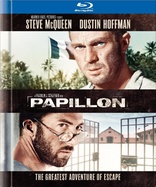Papillon Blu-ray Movie
HomePapillon Blu-ray Movie 
Warner Bros. | 1973 | 151 min | Rated PG | May 24, 2011Movie rating
7.9 | / 10 |
Blu-ray rating
| Users | 4.3 | |
| Reviewer | 4.0 | |
| Overall | 4.0 |
Overview
Papillon (1973)
Based on the true story of a petty criminal known as "Papillon". Wrongly convicted of murder in the 1930s and sentenced to life in a penal colony in French Guiana.
Starring: Steve McQueen (I), Dustin Hoffman, Victor Jory (I), Don Gordon, Anthony ZerbeDirector: Franklin J. Schaffner
| Drama | Uncertain |
| Biography | Uncertain |
| Period | Uncertain |
| Crime | Uncertain |
Specifications
Video
Video codec: MPEG-4 AVC
Video resolution: 1080p
Aspect ratio: 2.40:1
Original aspect ratio: 2.39:1
Audio
English: DTS-HD Master Audio 5.1 (48kHz, 24-bit)
Subtitles
English SDH, French, Spanish
Discs
50GB Blu-ray Disc
Single disc (1 BD)
Playback
Region free
Review
Rating summary
| Movie | 4.0 | |
| Video | 4.0 | |
| Audio | 4.0 | |
| Extras | 1.5 | |
| Overall | 4.0 |
Papillon Blu-ray Movie Review
The Great Escape Redux.
Reviewed by Jeffrey Kauffman May 18, 2011Steve McQueen was an escape artist. He was one of the first, and certainly one of the most successful, actors to escape a television series for big screen stardom. (McQueen had had some bit parts in films prior to his breakout success on t.v. as bounty hunter Josh Randall in Wanted: Dead or Alive, but it was that series that really put him on the map). McQueen eschewed his action star status at the height of his career to take on a much different sort of role in The Thomas Crown Affair. And a few years later he abandoned the movie business altogether to devote himself to his love of racing. His last few films show him completely escaping his movie star persona for a run at the brass ring of a title for which few may have previously considered him eligible: Actor. But at least two of McQueen’s most famous onscreen portrayals also dealt with escape. John Sturges’ 1963 The Great Escape became one of the biggest hits of McQueen’s career and catapulted him to the front rank of American leading men. McQueen’s glowering presence and athleticism informed that film and made it one of the most outstanding and exciting dramas of its era. Exactly ten years later, McQueen starred in another escape drama, Papillon, based on the best-selling memoirs of Henri Charrière, a small time crook who (he insisted anyway) was wrongly convicted of murdering a pimp and was sent to the brutal penal colony in French Guiana. While subsequent research has indicated that much (if not most) of Papillon was either fabricated or in fact happened to other prisoners, not Charrière himself, the book became an international sensation and it was a hotly sought after film property in the early 1970’s. McQueen might seem like an odd choice to play a French criminal, but if you can past that initial disparity, the film itself is a bristling (if overlong) entertainment that manages to convey the outright savagery of imprisonment on Devil’s Island as well as the unusual bond that two prisoners forge in order to survive both within and outside the confinement of the St. Laurent du Maroni prison camp.
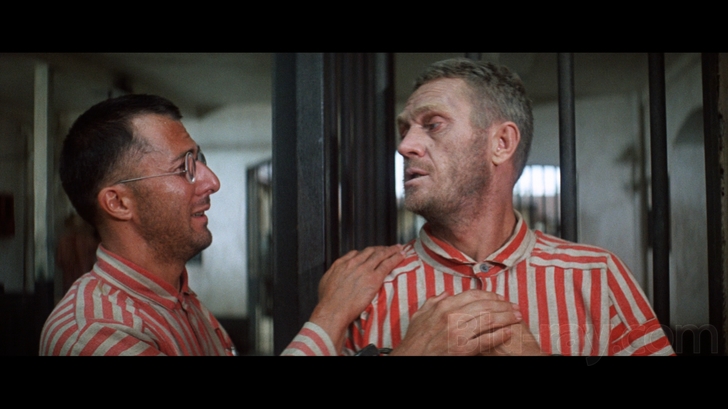
Papillon of course was not the first film to portray a supposed escape from the infamous Devil’s Island. Michael Curtiz’s 1955 opus We’re No Angels, starring Humphrey Bogart, charted a somewhat similar, if decidedly less brutal, course as it detailed the run for freedom by three hardened criminals. It’s perhaps not surprising, then, that Papillon’s co-star, Dustin Hoffman, here portraying an infamous forger named Louis Dega whose “work” with war bonds almost bankrupted the French government, seems to be channeling Bogart in both vocal approach and mannerisms. It’s a somewhat odd fit, perhaps even odder than that between McQueen and the “French” character he’s supposed to be playing.
Like the interminable imprisonment Papillon depicts, this is a film which builds slowly, perhaps a bit too slowly, carefully adding layers of character and situation. Franklin J. Schaffner was a very interesting director who was then at the height of his “epic” filmmaking career. Starting with a less than propitious big screen directorial debut with The Stripper, adapted from a William Inge play, Schaffner went on to helm several really fascinating and often brilliant films, including the wonderful Gore Vidal political satire The Best Man, as well as the iconic original Planet of the Apes. In between those two films he had his first shot at a really large canvas, the little remembered though quite compelling Charlton Heston starrer The War Lord. But after Apes, Schaffner went for the gusto with a series of huge films, including what is arguably his best and best-remembered, Patton, followed by the elegant if lumbering Nicholas and Alexandra and then Papillon. But at this stage of Schaffner’s career, he was a director who wasn’t above taking his time to very carefully craft ambience and character beats, and those two traits are on display in abundance throughout Papillon.
Two disparate though telling examples of this slowness come from completely different idioms within the film. Pay attention to how long you have to wait until you get even a taste of Jerry Goldsmith's underscore in Papillon. Unlike other Schaffner-Goldsmith collaborations (and there are many), this film doesn't start with a "big" credits sequence playing to a memorable Goldsmith theme, and there's in fact a rather surprisingly long wait before any underscore appears. But perhaps even more tellingly, this two and a half hour film is well past the halfway point before the "main" escape even begins to play out. That first half is certainly not without drama and some viscerally exciting sequences, but Papillon is as much about the characters and their interplay as it is about the flight from Devil's Island, ostensibly the "focus" of the film.
Papillon is virtually dripping in ambience, and not just because of the supposedly muggy weather on Devil’s Island. Schaffner, scenarist Dalton Trumbo and production designer Anthony Masters work together to create a truly terrifying locale, especially when Papillon (Charrière’s nickname, which means “Butterfly”) is isolated for two years (!) in solitary after a failed escape attempt. (The film actually kind of glosses over just how long this extended isolation lasted, although the devastating effects on Papillon’s body and psyche are shown, to rather disturbing effect). Gritty, grimy and filled with the detritus of dead and dying bodies, the penal colony is literally hell on earth, and it’s absolutely little wonder that many tried to escape, no matter how daunting the odds. (Pay attention to the opening scenes on the island. That young man attempting an escape is none other than Billy Mumy, Will Robinson to you Lost in Space fans. He shows up again in a dream sequence later in the film).
For the most part Papillon works in spite of its length and deliberately slow pacing. McQueen and Hoffman make a rather odd couple as co-stars, and each makes occasional missteps. Hoffman doesn’t seem to know whether he’s channeling Bogart all of the time, and that makes for an at times uneven performance, though he has a couple of really incredible moments, including his tearful realization of what Papillon’s loyalty to Dega has exacted from Charrière both physically and spiritually. McQueen doesn’t even make a pretense at playing his character as a Frenchman, but if you can get past that disparity, he delivers a really haunting performance for the bulk of the film. He, too, occasionally mugs unnecessarily, including an uncomfortable sequence when Papillon and Dega realize they’ve been taken advantage of (for the second time) in an escape attempt and the boat they think is waiting for them turns out to be a dilapidated wreck.
While Papillon was marketed as a sort of "greater escape" and Charrière’s relentless quest for freedom is certainly the underlying subtext of all that happens in the film, the real emotional tenor of the film is built around the odd and endearing relationship between Papillon and Dega. In fact Papillon seems to slow down considerably once Dega is out of the picture for a good spell of the time in the film’s final third, when Papillon seems to drift into some sort of weird remake of Mutiny on the Bounty, where he’s “adopted” more or less by natives. The last few moments of the film, when Dega reappears, are touching but also discomfiting, as the two have obviously been too fractured emotionally and mentally to ever truly reclaim their younger glory. Schaffner lets Papillon get the last laugh, though, as he screams to the invisible powers that be that he’s still there, like it or not. That indomitable spirit suffuses Papillon with a rather surprisingly optimistic content despite its often dour and really unsettling surroundings.
Papillon Blu-ray Movie, Video Quality 
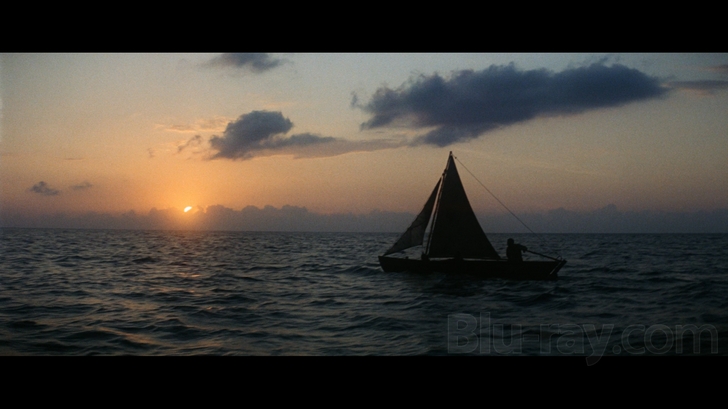
Papillon breaks into Blu-ray with a nice looking AVC/1080p transfer in 2.40:1 which very accurately reproduces the original film's rather soft and hazy look. Some people who haven't seen Papillon previously may in fact be more than a little shocked at just how soft and gauzy the film is a lot of the time, but that is how it has always looked, due either to outright choices by Schaffner and DP Fred Koenekamp or due to what must have been extremely difficult location shooting challenges. Nonetheless, there's a rather startling uptick in fine detail on this release from the previous DVD outing, and colors are incredibly lush and beautifully saturated. Some of the jungle scenes now reveal levels of shadow detail which weren't visible on previous home theater releases of this title. This increased clarity and resolution can also show some of the makeup effects on both McQueen and Hoffman in less than flattering detail. But the luscious location photography of Papillon really glistens now with increased sharpness and detail and most fans of this film should be very well pleased with this high definition presentation.
Papillon Blu-ray Movie, Audio Quality 
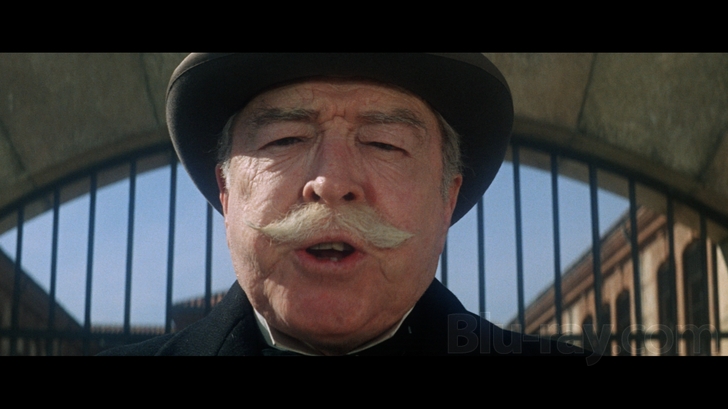
Papillon is granted a lossless DTS-HD Master Audio 5.1 mix that may be a little shallow on consistent surround activity but which delivers a very nuanced and involving mix. Right off the bat, with the click of boots and the paradiddles of military drums, we get some nice, blistering effects and the film proceeds to evoke a rather claustrophobic soundscape before Papillon and Dega are even in the confines of their hideous jail. There is some very nice use of the surround channels in several of the initial outdoor sequences once they do make the jail, especially the long sequence in the rain. Fidelity is excellent and Jerry Goldsmith's rather minimal score (which received the film's only Oscar nomination) is also very well represented.
Papillon Blu-ray Movie, Special Features and Extras 
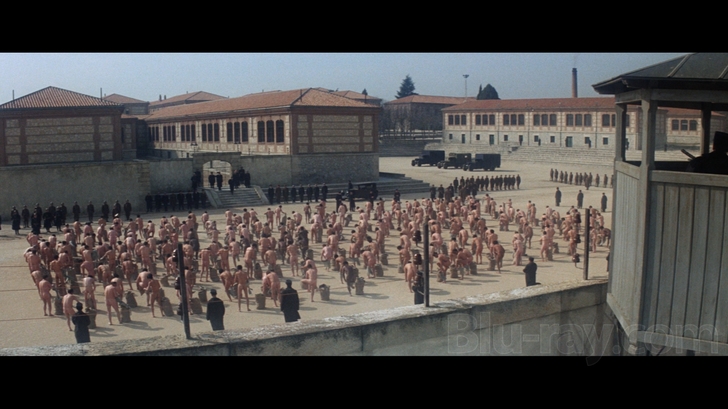
- The Magnificent Rebel (SD; 12:19) is a nice, albeit brief, vintage featurette which has some great footage showing how hard it was to film on location.
- Trailer
Papillon Blu-ray Movie, Overall Score and Recommendation 
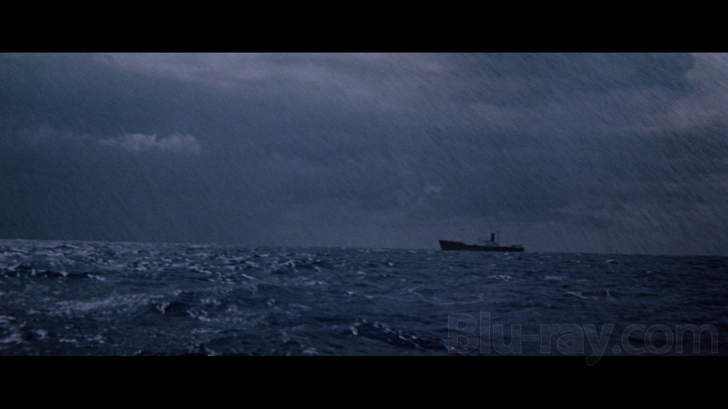
Papillon is a slow, relentless trek with two extremely odd characters, and that may be off putting for some viewers. Filled with a number of disturbing elements, this is a film not for the faint of heart and/or stomach. And while McQueen and Hoffman are decidedly different types of actors, they actually meld surprisingly well together here. Schaffner keeps things well under control, if deliberately slow-paced, and the film is a viscerally frightening look at the horrors of the French Guiana penal colony, as well as the indomitable human desire to be free. Highly recommended.
Similar titles
Similar titles you might also like

Papillon
2017

Rescue Dawn
2006

Midnight Express
1978

Unbroken: Path to Redemption
with Booklet
2018

The Shawshank Redemption 4K
1994

Empire of the Sun
25th Anniversary Edition
1987

The Railway Man
2013

Churchill
2017

Seven Years in Tibet
1997

A Perfect World
1993

There Be Dragons
2011

Escape from Alcatraz 4K
1979

The Colditz Story
1955

Jarhead
2005

Mr. Selfridge: The Complete Second Season
Original UK Edition
2013

Cool Hand Luke 4K
1967

Capone
2020

Carlito's Way 4K
1993

Little Dieter Needs to Fly
1997

Nixon
Election Year Edition
1995
